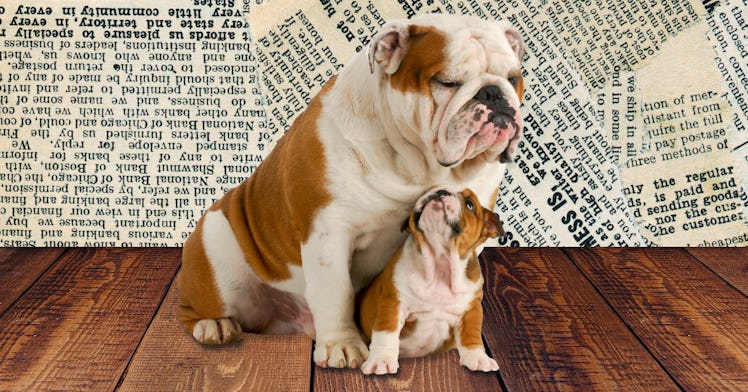There’s No Such Thing as a Good Dog Dad, Apparently
Dogs are great family companions but pretty terrible fathers to their own young. What gives?

Dogs are natural members of the family. They’re protectors, companions, confidants. And many (well-trained) dogs are excellent with children, showing a seemingly endless patience for the bear hugs and aggressive belly rubs that kids lavish upon them. How often has a viral video of a dog waiting for their sibling to get on or off the bus gone viral? Or a well-timed clip of a dog snuggling up to an upset pet parent shown families how much dogs know how we’re really feeling and care for us? Which is why it’s so odd that, when it comes to their own puppies, dog dads tend to fall behind the curve. In fact, if humans don’t force them to interact with their own young, dog dads would just as soon take off, abandon their dog litter, and leave all the parenting work to mom. And as it turns out, it might be our fault.
All dogs are descendants of wolves. But as domestic dogs became dependent on humans, they lost many of their wolf characteristics says Carlo Siracusa, director of the animal behavior service at the University of Pennsylvania’s Matthew J. Ryan Veterinary Hospital. And one major difference between modern wolves and dogs is in their parenting skills. For wolves, he said, parenting is a two-man job.
“The unit structure of a wolf pack is the family,” Siracusa explained. There’s a common misconception that wolf packs consist of many unrelated individuals, led by an alpha pair. But packs are generally composed of mom and dad and their puppies, which can include newborns as well as older pups that just haven’t left the nest yet. Mom and dad act as leaders, or alphas, of the pack because, well, they’re the parents. When their dog babies become dog dads, they, too, will split off to form their own pack, and become alphas themselves.
And within these family units, both mom and dad help to raise the babies. They take turns hunting, bringing back food, and keeping watch over the smallest ones. They may even be assisted by the older family members as well.
But this isn’t true with domesticated dogs, Siracusa notes. As gentle and affectionate as dogs often are with human children, male dogs invest very little effort into paternal care when their own babies are born. Puppy-raising is almost entirely the mom’s job.
This, per Siracusa, can have big consequences for strays. The puppies of feral dogs tend to have low survival rates, even lower than those of wolves, probably in part because mom doesn’t get any help taking care of them.
“As a general rule, male dogs don’t collaborate to the defense of the puppies,” Siracusa said. “They might collaborate to the defense of the territory around them, but because there are resources there.”
This might end up being an evolutionary disadvantage if domesticated dogs were meant to live on their own. But, as Siracusa noted, “their natural habitat is actually living with us,” where humans now help feed them and take care of the puppies.
Many owners might protest the idea of deadbeat dog dads — and indeed, some male dogs are patient and playful with their own young, or with unrelated puppies that their human owners bring home to live with them. But this is often because humans have forced them to coexist in a space together. This isn’t true when they’re left to their own devices. “In general as a species they are not as good as male wolves,” says Siracusa.
The exact reasons why parental behavior changed from wolves to dogs in the first place are hard to pinpoint, he added. In the wild, animals evolve as a result of the pressures of natural selection, which weeds out traits over time that put species at a disadvantage. And, indeed, there are many wild species that have naturally evolved a parental system in which the female does all the work in raising the young.
There are reproductive advantages to both systems: When males invest effort into parenting, they may be upping the chances that their own young — and thus, their own genes — will survive, while also preventing their mates from pairing with another male and passing on someone else’s genes in the meantime. Males that don’t invest in parental care may have the freedom to go around producing offspring with many more females, which can also increase their odds of passing on their own genes.
In domestic animals, though — dogs included — it’s sometimes hard to say whether a certain behavior would have arisen naturally or not. That’s because humans have the ability to selectively breed traits into their pets that wouldn’t necessarily benefit them in a wild environment.
In any case, the change in parental behavior from wolves to dogs is very likely a byproduct of a much larger shift that humans have wrought in their social behavior.
“We’ve taken their natural social skills and modified those social skills for the dog to be able to communicate with humans,” he says. In fact, he says, some research has suggested that dogs are actually better at interacting with humans than they are with other dogs, especially dogs of different breeds. The price of breeding dogs to be less social with another — and more social with us — may be that some of their cooperative behavior, such as co-parenting, has simply disappeared.
For the dog, though, that seems to have worked out just fine. Humans feed them, shelter them and, yes, raise their puppies too with no help from dad needed. In return, children reap the benefits of thousands of years of domestic dog breeding. And while it may have resulted in some deadbeat dog dads, it also produced man’s best friend.
This article was originally published on